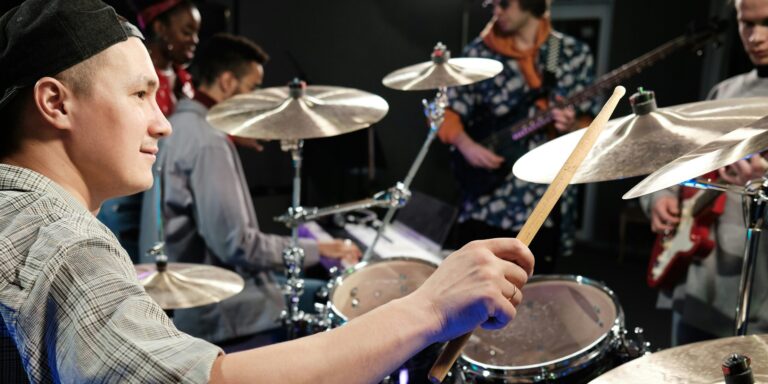Artificial Intelligence is making waves across all sectors, and the music industry is no exception. From generating compositions to assisting with music production, AI is becoming an increasingly powerful tool for musicians. However, there is growing concern about its potential to replace human artistry. In this opinion piece, we will examine whether AI is enhancing creativity or threatening the livelihoods of musicians.
Introduction: AI’s Growing Role in Music
The integration of Artificial Intelligence (AI) into the music industry is transforming how artists create, produce, and release music. Musicians, both independent and established, are using AI-driven platforms to compose, arrange, and refine their tracks. Tools like Amper Music and AIVA allow creators to produce entire compositions without formal music training. While AI offers groundbreaking opportunities for creativity, it also sparks debates about the diminishing role of human artistry in music production.
The Benefits of AI in Music Production
AI brings several advantages, particularly in streamlining production workflows. Music creation, especially for complex genres, can be time-consuming and tedious. AI platforms can drastically reduce production time by automating tasks like track mastering, mixing, and even songwriting. For example, AI tools such as LANDR help musicians polish their tracks in a fraction of the time it would take a human engineer. Additionally, these tools provide technical precision, ensuring that songs meet industry standards without requiring an extensive technical background.
AI can also assist with songwriting, offering suggestions for melodies, harmonies, and even lyrics based on patterns found in existing music. For many artists, this can be an invaluable source of inspiration, helping to break through creative blocks. Musicians can experiment with fresh ideas that might not have otherwise occurred to them. For emerging artists, AI tools democratize the music production process, eliminating financial and technical barriers to entry. Independent musicians can create professional-quality music from their bedrooms, leveling the playing field in the industry.
The Downsides: Risks to Originality and Artistic Integrity
While AI’s role in music production is largely beneficial, it poses some serious concerns regarding originality. Music is not just a technical exercise—it’s a form of emotional expression. AI can generate music that sounds good but lacks the depth and soul that human artists inject into their work. Critics worry that the rise of AI-generated music may lead to a homogenization of sound, where songs follow similar algorithms, rather than reflecting the unique perspectives of individual musicians.
Furthermore, AI’s ability to produce music based on patterns raises questions about the authenticity of its creations. Music is often deeply tied to personal experiences, cultural contexts, and emotions. These qualities are difficult, if not impossible, for a machine to replicate. As AI-generated music becomes more popular, the question arises: will listeners be able to tell the difference between human-created and machine-created music? If AI can create music with little human input, will the true artistry of music be lost?
The Debate on Job Losses in the Music Industry
The rise of AI in music also raises concerns about job displacement. As AI platforms like Amper Music and AIVA become more sophisticated, there is growing anxiety about the future of jobs within the music industry. Traditionally, composers, producers, and session musicians played key roles in the music creation process. Now, AI is capable of handling many of these tasks. For example, AI tools can generate entire tracks in a matter of minutes, something that would normally take a composer or producer much longer.
While AI offers a faster and more efficient way to produce music, it could also reduce the demand for professional musicians. Some fear that over-reliance on AI may result in job losses or the undervaluing of human talent. The accessibility of AI-powered tools means anyone with an internet connection can create music, potentially flooding the market with low-cost tracks and decreasing the financial value of professional music.
Even established musicians are experimenting with AI in their creative processes. While this can enhance their work, it raises questions about how much of the industry should be driven by machines. If AI begins to dominate music production, it could undermine the value of human creativity, leading to an oversaturation of content and a reduction in the overall quality of music.
Can Musicians and Technology Coexist?
Despite the concerns, AI should not be viewed as inherently negative for the music industry. Like any tool, it has the potential to enhance creativity if used properly. Many musicians view AI as a collaborator—an aid that helps them express ideas they may not have considered on their own. Rather than replacing human creativity, AI can augment it, providing new perspectives and opening up possibilities for exploration.
The key challenge will be finding a balance between using AI to improve production workflows and preserving the unique human touch that gives music its emotional resonance. Musicians must ensure that AI remains a tool for inspiration rather than a substitute for their artistry. While AI can assist with technical tasks, it cannot replace the authenticity, emotions, and stories that only human musicians can infuse into their work.
As AI continues to evolve, the most successful musicians will be those who embrace the technology without allowing it to overshadow their creative vision. AI should complement human creativity, not replace it.


